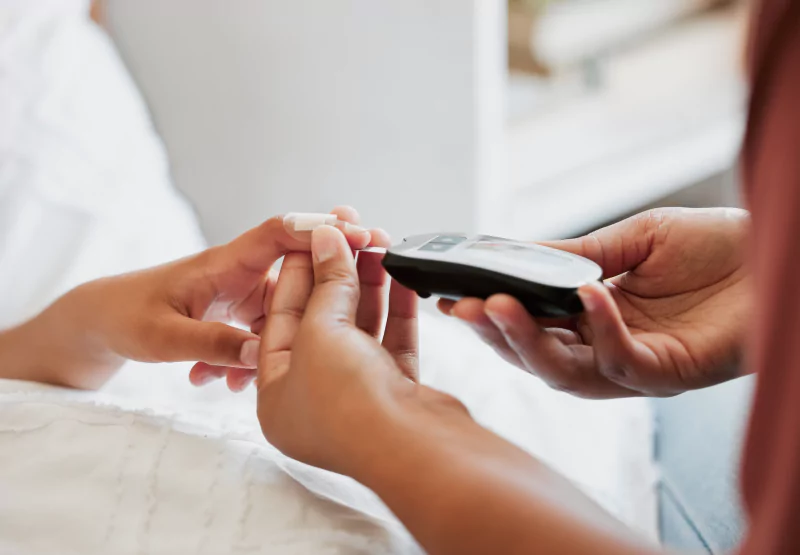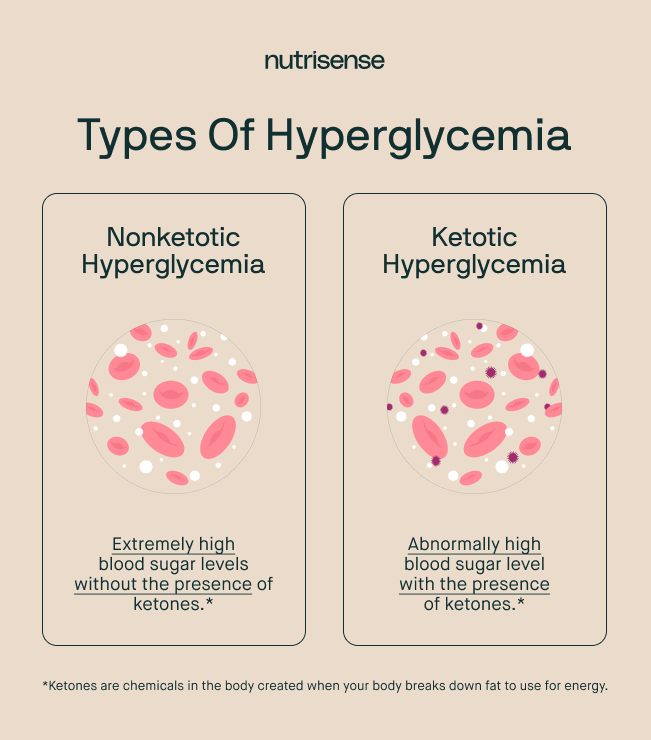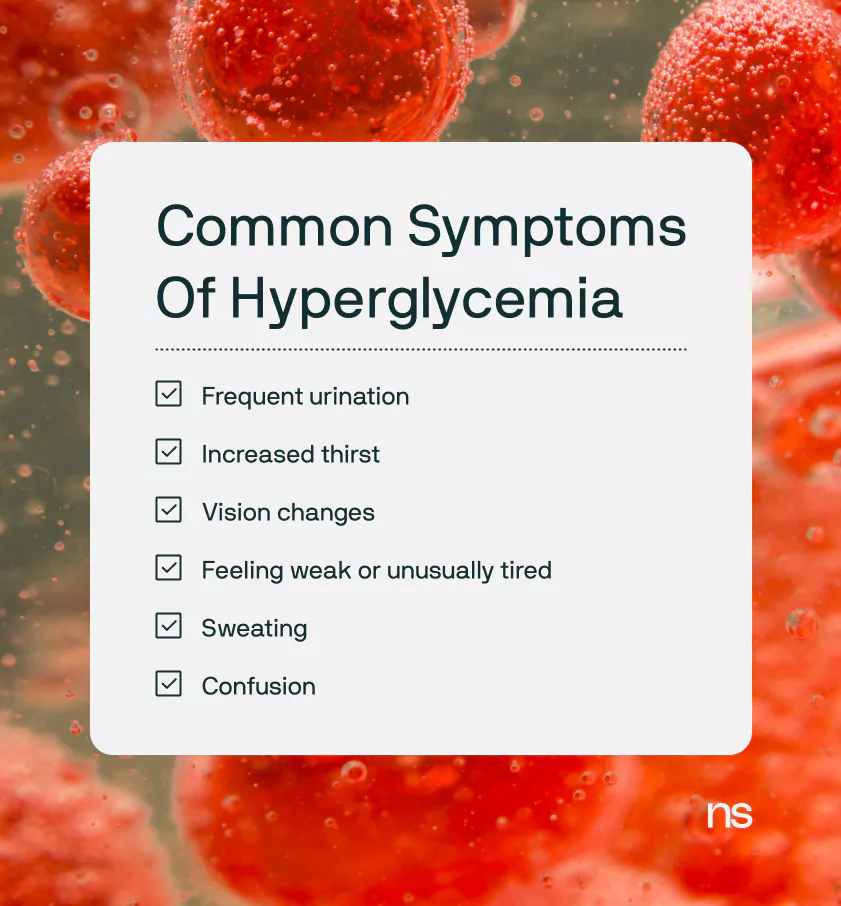Can Hyperglycemia Cause Seizures?

Key Takeaways
Hyperglycemia, or as we commonly know it, high blood sugar, can be the underlying cause of everything from frequent urination and increased thirst to weakness and fatigue. For people with diabetes, it can also have more serious effects. Hyperglycemic seizures, which occur mostly due to very high levels of blood sugar (but there are other causes as well, as we detail below), are one of those risks for diabetic patients.
Wondering how to check whether you or a loved one may be at risk for such complications of high blood sugar and how to minimize this? Read on to learn more about the surprising relationship between hyperglycemia and seizures.
Can High Blood Sugar Cause a Seizure?

Though hyperglycemia is a complication commonly associated with certain health conditions, such as type 2 diabetes and PCOS, others can experience it. Lifestyle factors like diet, body weight, stress levels, physical activity, and certain medications also affect blood sugar levels.
So why is high blood sugar linked to seizures? Studies show that high blood sugar can increase the excitability of neurons in the brain. When this occurs, it can disrupt signaling in the brain and cause seizure activity.
Some research suggests that hyperglycemia may affect gamma-aminobutyric acid (GABA) levels in the brain. GABA is a neurotransmitter that prevents or blocks chemical messages and reduces the stimulation of nerve cells in the brain. However, this needs more research since it may depend on the severity of the hyperglycemia, insulin levels, and so on.
Having lower levels of GABA is known to result in seizures in some cases, but this, too, depends on other factors. Overall, hyperglycemia may contribute to seizures in some, but it’s specific to individual cases, and research on its effects on blood sugar is still ongoing.
Types of Seizures Linked To Hyperglycemia
Seizures associated with high blood sugar are considered provoked epileptic seizures (also known as acute symptomatic seizures), and don't necessarily mean you have epilepsy.
Some of the types of seizures that affect people with hyperglycemia include:
Hyperglycemia has been observed to lower the seizure threshold. However, the exact link between hyperglycemia and seizures is not entirely understood and is still the subject of research.
Can Low Blood Sugar Cause a Seizure?
Extremely low blood sugar (also called hypoglycemia) can also lead to certain complications, including generalized seizures. Studies show that a seizure due to low blood sugar is likely to happen during sleep and is more likely to happen to children than adults.
It's not clear exactly why this happens, and some research shows that the incidence of seizure as a result of low blood sugar is rare. Some studies also suggest that reducing high glucose values due to fasting can decrease the risk of seizures in adults.
More research in the field of neurology is still needed to determine the link between hypoglycemia and seizures. However, there are numerous cases where insulinoma (tumor of the pancreas causing insulin overproduction) can mimic the symptoms of a seizure and can lead to a misdiagnosis.
The Two Types of Hyperglycemia that Cause Seizures

Two types of hyperglycemia have been known to cause seizures: non-ketotic hyperglycemia (NKH) and ketotic hyperglycemia.
Let's take a closer look at the causes and symptoms of these conditions.
Nonketotic Hyperglycemia
Non-ketotic hyperglycemia occurs when you have very high blood sugar levels without ketones. Ketones are chemicals in the body created when your body breaks down fat to use for energy. Non-ketotic hyperglycemia is also called diabetic hyperglycemic hyperosmolar syndrome, or HHS.
HHS has multiple causes and is usually seen in people with unmanaged type 2 diabetes. Diabetic hyperglycemia can be caused by infection, illnesses, some medications, or not taking prescribed diabetes medications.
Usually, the kidneys compensate for high blood sugar levels by sending excess glucose out of the body through urine. This causes the body to lose a lot of water, leading to dehydration.
In some cases, high blood sugar levels can lead to non-ketotic hyperglycemia-related seizures. These types of seizures are also referred to as focal seizures, which affect a particular area of the brain and can affect people with all kinds of diabetes mellitus (type 1, type 2, and gestational diabetes).
Though researchers don't currently have proven hypotheses as to exactly how these seizures happen, it's estimated that about 25 percent of people who experience non-ketotic hyperglycemia develop seizures.
If you have an abnormally high blood sugar reading, experience a loss of consciousness, or a seizure, seek care from your healthcare professional right away.
Ketotic Hyperglycemia

Ketotic hyperglycemia involves abnormally high blood sugar with the presence of ketones. Ketones, as mentioned earlier, are made when the body enters a state of ketosis and breaks down fat to use for energy.
Your body may do this when it doesn't have enough insulin to make use of glucose, which is your body's normal source of energy. This can also happen if the body is producing insulin but is unable to function normally at the receptor level. Normally, ketones are used by your muscles and heart.
But when your body creates ketones too quickly or in much higher amounts, these high concentrations can cause your blood to become acidic. This is a serious medical condition known as diabetic ketoacidosis, or DKA.
DKA mainly affects people with type 1 diabetes and is often the first sign of type 1 diabetes in people who have yet to be diagnosed. Infection, injury, illness, or missing insulin doses can all lead to DKA.
Though the exact reason is unknown, people who experience DKA also may have seizures more frequently.
Important Warning Signs of a Seizure That May Be Caused by Hyperglycemia

Since these seizures aren’t only caused by diabetes or hyperglycemia, how do you know when they are? Understanding the risk factors and early symptoms of hyperglycemia is a good first step. You’ll be more aware and also may be able to avoid complications like seizures in some instances.
Signs to watch for include:
- Frequent urination
- Increased thirst
- Blurry vision
- Feeling weak or unusually tired
- Elevated HBA1C levels (sometimes called A1C)
- Fever
- Sweating
- Confusion
- Shortness of breath
- Fruity-smelling breath
- Dry mouth
- Frequent hunger
If you experience any or all of these symptoms, consult a healthcare professional. You may also want to follow up by monitoring your blood sugar levels in between consultations.
Treatment for Seizures Caused by Hyperglycemia

As we mentioned earlier, if you experience a seizure, you should seek medical attention immediately. A seizure may be a sign of severe hyperglycemia.
There are a few treatment options that can help treat hyperglycemia-induced seizures. These treatments may include:
- Intravenous fluid replacement will help replace fluids lost through urine and dilute the extra sugar in your blood.
- Electrolyte replacement can ensure your heart, muscles, and nerve cells work as they should.
- Insulin therapy can reduce blood sugar and reverse the processes that cause ketones to build up in the blood.
- The administration of antiepileptic drugs may be used in some cases.
- Glycemic control through diet and lifestyle changes may be recommended to lower blood sugar levels over time.
Hyperglycemia-induced seizures can sometimes lead to certain complications that can cause abnormalities in magnetic resonance brain scans and EEG changes. However, these are generally thought to be reversible.
After your immediate condition is addressed and treated, you should visit your healthcare provider to discuss the next steps to avoid further complications of hyperglycemia. In some cases, seizures related to non-ketotic hyperglycemia can lead to brain damage if left untreated.
Other Common Diabetes Complications Related to Hyperglycemia
Hyperglycemia (mainly if not appropriately managed) can lead to a host of complications beyond seizures. Prolonged high blood sugar levels damage blood vessels and nerves, affecting nearly every organ system in the body.
Other common health complications include:
- Heart disease and increasing risk of heart attack
- Kidney disease and kidney failure in severe cases
- Develop diabetic retinopathy, suffer from blurred vision or vision loss in severe cases
- Obesity
- Liver disease
- Poor wound healing and increased risk of infection
- Erectile dysfunction in males
- Increase in blood pressure
Early diagnosis of diabetes, proper diabetes care, and lifestyle changes to manage high blood sugar levels may help prevent or delay the onset of these complications. If you are experiencing any symptoms associated with hyperglycemia, seek medical help from your healthcare provider immediately.
Remember, prevention is always better than cure. If your family has a medical history of diabetes, it's essential to take proactive steps in managing your health.
Tips from a Glucose Expert to Help Avoid Hyperglycemia
Taking steps to manage and treat high blood sugar can help you avoid seizures caused by hyperglycemia. Talk to your doctor about how to keep your blood sugar levels in a healthy range. Certain lifestyle and diet changes may also be beneficial.
Here are some helpful tips from the glucose experts at Nutrisense to help maintain a healthy blood sugar level to avoid seizures and other serious complications
1) Physical Activity

Regular exercise can keep blood sugar in a healthy range. When you exercise, your body uses excess glucose for energy. Moderate activity, such as walking, stretching, and moderate weight lifting, is likely to positively affect blood sugar. However, before exercising, you should check with your doctor to see if ketones are in your urine.
2) Eat A Healthy Diet
Those with diabetes or insulin resistance may experience lower glucose tolerance and lower tolerance to higher carb-containing foods. Some research has shown that a lower-carb dietary approach may benefit some. Here are some areas to focus on:
- Meet your protein needs with nutrient-dense whole foods.
- Fill half your plate with nutrient-rich, non-starchy vegetables. These vegetables contain fiber and lower amounts of overall carbohydrates, which can help you maintain healthy blood sugar and support insulin sensitivity.
- Include plenty of healthy fats from foods like seeds, nuts, avocados, fatty fish like salmon, and olive oil.
- If you want to test how well you tolerate some carbs like whole grains, beans, or whole fruit, consider practicing meal sequencing.
- Minimize intake of added sugars, processed foods, and alcohol.
3) Check Your Blood Sugar Often
Checking your blood sugar often can help determine when it is high enough to seek treatment. If you have diabetes, you may need to check it more often.
According to the American Diabetes Association, a normal fasting blood sugar level range of less than 100 milligrams per deciliter (mmol/dL) is generally safe. However, levels can vary, especially if you have a medical condition or are taking certain medications.
Instead of constantly taking blood samples throughout the day, some people may use a continuous glucose monitor, or CGM, a small, painless device that attaches to your arm. A CGM allows you to see your blood sugar levels in real-time throughout the day, and when paired with personalized support from a glucose expert (like a registered dietitian or nutritionist), can help you avoid as well as manage complications and symptoms of health issues like hyperglycemia.
4) Seek Advice From Your Healthcare Provider

Following professional advice is crucial to maintaining healthy blood sugar levels and treating potential complications from imbalances. This may include taking all prescribed medications as instructed, exercising regularly, and following a low-glycemic diet or a diet best suited to your needs.
Find the right Nutrisense programto turn insight into progress.
Maintain Healthy Blood Glucose Levels with Nutrisense’s Expert Support
Hyperglycemia can be a sneaky and dangerous condition, but you can manage it effectively with the right tools and strategies. With Nutrisense’s glucose solutions, including personalized, insurance-covered video calls with a glucose expert and the Nutrisense CGM program, you'll learn to track your blood sugar levels, address underlying symptoms, and get to the root cause to help manage conditions for long-lasting success with your health goals.
Our board-credentialed nutritionists and dietitians are here to guide you in making the necessary lifestyle changes to maintain a healthy blood sugar level and prevent or delay potential complications. Start today by taking our quiz to see how Nutrisense can help you on your journey to better health.
Go Beyond Glucose Data with Nutrisense
Your glucose can significantly impact how your body feels and functions. That’s why stable levels are an important factor in supporting overall wellbeing. But viewing glucose isn't enough. Nutrisense, you’ll be able to learn how to use your body's data to make informed lifestyle choices that support healthy living.
One-to-one coaching
Sign up to access insurance-covered video calls to work with a glucose expert: a personal registered dietitian or certified nutritionist who will help tailor your lifestyle and diet to your goals.
Monitor and measure what matters
With the Nutrisense CGM Program, you can monitor your glucose with health tech like glucose biosensors and continuous glucose monitor (CGM)s, and analyze the trends over time with the Nutrisense App. This will help you make the most informed choices about the foods you consume and their impact on your health.
Find your best fit
Ready to take the first step? Start with our quiz to find the right Nutrisense program to help you take control.

Amanda is a Nutrition Manager and Registered Dietitian, with a Masters in Dietetics from Stephen F. Austin State University. Originally from south GA, she got her undergrad degree from Texas Tech University. She worked at a hospital in Fort Worth, TX, for 4 years as a dietitian, counseling those living with HIV.




